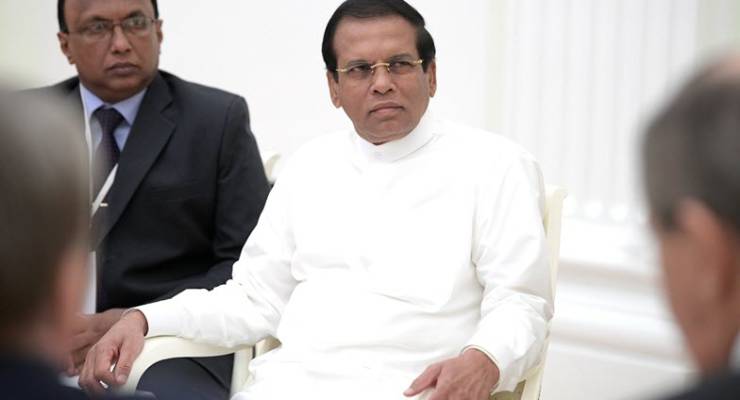
While the world wasn’t watching, Sri Lanka has had a coup, which may or may not be constitutional. On Friday, the president replaced an elected prime minister with one who had been voted out of office on the back of war crimes allegations, human rights abuses and corruption allegations.
Following the withdrawal of a governing coalition partners last week, Sri Lanka’s President Maithripala Sirisena announced the sacking of Prime Minister Ranil Wickremesinghe and the appointment as his replacement of former president Mahinda Rajapaksa.
Soldiers were deployed around Colombo. One person was killed and two wounded when the Petroleum Minister’s bodyguard fired on protesters jostling the minister as he tried to enter a government office.
In 2009, as executive president, Rajapaksa presided over the defeat of the separatist Tamil Tigers, with the loss of up to 40,000 mostly civilian lives in the final months of the campaign. In 2015, Foreign Affairs Minister Mangala Samaraweera claimed that the Rajapaksa family in office had siphoned off up to US$18 billion of public funds into offshore accounts.
The president, who shares power with the prime minister following constitutional changes in 2015, does not have the constitutional power to change prime ministers without the approval of parliament. While the president appoints as prime minister the person they believe commands the support of a majority of the parliament, it was not clear that Rajapaksa enjoyed majority support.
Moreover, the president immediately suspended parliament for three weeks so there could be no vote of confidence in either the ousted prime minister or his replacement. Rajapaksa has, however, wasted little time, summoning senior military leaders to ensure him of their support, with some previously uncommitted MPs believed to be crossing to his side.
Following the president’s announcement, ousted prime minister Wickremesinghe went on air declaring that he remained as prime minister, and refusing to leave the prime minister’s residence. Finance Minister Managala Samaraweera said that the appointment of Rajajapksa as prime minister was “unconstitutional and illegal” and that his appointment was an “anti-democratic coup”.
Parliamentarians and others loyal to Rajapaksa quickly forced their way into state-owned television stations, with some stations were taken off air. Non-government stations have, meanwhile, decried the coup.
While Sirisena defeated Rajapaksa in the 2015 presidential elections, the pair had previously been close, with Sirisena serving as Rajapaksa’s defence minister during the end of the Tamil Tigers campaign. The two men were reported to have more recently mended their relations. Sirisena’s relationship with Wickremesinghe had, at the same time, become distant and confrontational.
Following the defeat of the Tamil Tigers in 2009, Sri Lanka went through an authoritarian phase under then-president Mahinda Rajapaksa’s dominant leadership. However, his electoral defeat in 2015 and subsequent changes to Sri Lanka’s constitution improved the country’s democratic health and partially restored its damaged human rights record.
Sri Lankan human rights NGOs have expressed deep concern for Sri Lanka under a return to rule by Rajapaksa, in particular the way in which he seems to have achieved power. While the constitutional crisis reflects domestic political tensions, it will also play out in international relations, with Rajapaksa likely to take Sri Lanka closer to China, following Wickremesinghe’s attempts to strike more balanced relations between India and China.
Damien Kingsbury is Deakin University’s professor of international politics and author of Sri Lanka: Politics, Ethnicity and Genocide.








Thanks for this. I had no idea about this significant change. Not good news.
It’s not all doom and gloom surely?
On the plus side, just think of how happy “Mozzie” and “Lady Penelope” will be to see their mate back? Remember the “deals” they were happy to make with their “Raja”?
… True the Commonwealth was less than impressed with his “habits” – but “we” were?
You beat me to it – bugger NZ, we might now have a new prison island to dump “the teeming refuse”.
No, I didn’t miss it. One step forward, one giant leap backward, for Sri Lanka. And any Australian government that insists Tamil refugees are not refugees, and will be subject to refoulement, is acting just like…uhm…well, just like an Australian government. A bunch of ….. .